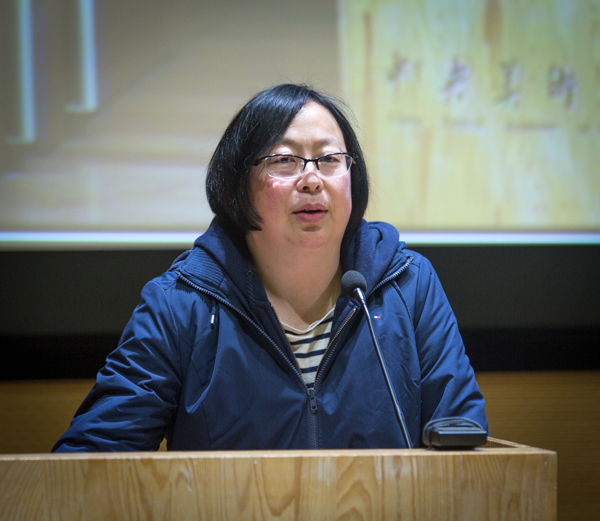
19日下午,当代学术开放讲堂在中央美术学院美术馆学术报告厅如期迎来了第十讲,主讲人为当代中国最重要的哲人之一——刘小枫教授,学术主持宋晓霞教授在讲座伊始一如寻常地点明了讲堂的主旨是为视觉艺术的创造力、想象力和思考力建构不同的思想维度。

宋晓霞
今日讲堂的主题名为“卢梭论商业文明与艺术家的德性”,主要涉及启蒙时代法国思想家卢梭对商业文明、民主政治制度及其与艺术家、艺术创作之间关系的深入思考。这是启蒙时代的欧洲在逐渐步入讲求人人平等自由的政治环境后所面临的自身反照的问题,即商业文明的教旨与需要天赋的艺术创作之间如何协调?“平庸”的人性如何才能回溯到永恒的德性?
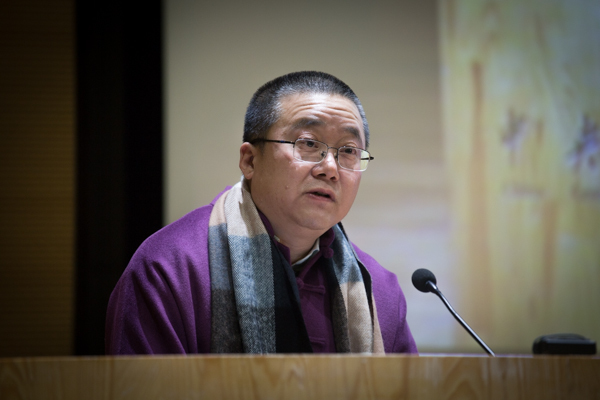
刘小枫
一、孟德斯鸠的遗留问题
刘小枫教授首先指出,商业文明与艺术天赋的关系问题在18世纪早期,随着商业文明的发展已经较为突出了。围绕着任何类型的天赋只是少数人具有,商业文明是否有利于人才发展的论点,当时的思想理论界进行了大规模地讨论。卢梭的成名作——《论科学和艺术》就是针对当时法兰西科学院提出的命题“复兴科学与艺术是否有益于纯化道德风尚?”作出的回应。
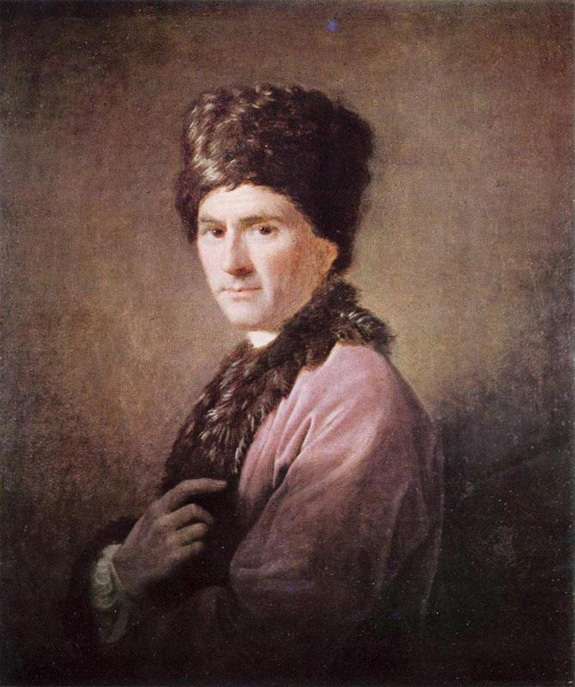
卢梭
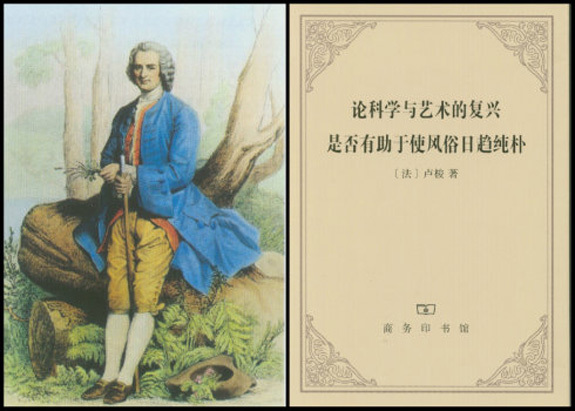
卢梭《论科学与艺术》
为什么君主体制下的科学院会出这样一个命题?主要原因是复兴科学和文艺能鼓励更多的人从事这些职业。但卢梭对此作出否定的回答,他认为从事有关文艺职业的人越多,越不利于其发展。卢梭认为随着商业文明发展,每个国家开始互相交流,但这些交流的东西未必都是好的,也有可能败坏这个国家的道德风尚。这又涉及了“道德风尚”的概念。道德风尚是与政治制度联系在一起的,可以说是一体的两面。它与气候、地理以及传统都相关联。卢梭在之后发表的《社会契约论》中谈到四种法律分类,第一种是根本法,今天叫做宪法;第二种相当于民法;第三种相当于刑法;最后一种法律是不成文的、铭刻在公民心中的限制,即道德风尚。中国的道德风尚也称为“礼法”,来源于周公和孔子,可谓人心中的法则和基础。
因而,法兰西科学院的命题的实际含义是能否通过科学和文艺来改造道德风尚。这涉及到改变政治制度内在秩序的问题,道德风尚是由一个民族最古老的立法者奠定的,而提出改变的就是当时的共和政治家。这个题目就是一个时代的表征,卢梭对此提出了批判,尤其对文艺的品质提出了指控,认为现在提倡文艺不仅不能提高文艺的质量,反而会败坏人们心中的道德次序。250多年以来,卢梭的话应验了,传统的道德风尚被新的一波波的革新取消了。
卢梭的论点主要来源于孟德斯鸠的著作——《论法的精神》。这本书在本质上不是要研究一般的法律问题,而是要研究一种精神,即道德风尚。道德风尚又不是传统意义上的道德,而是自由民主政治理念的来源。因此孟德斯鸠要推广的是一种商业文明的道德风尚,他也是第一位把商业文明和民主政治结合起来的思想家。在孟德斯鸠看来,好的政治制度就是以商业文明标明的。但他面临一个问题,即如何验证商业文明中的生活方式是好的,而且好过传统生活方式?
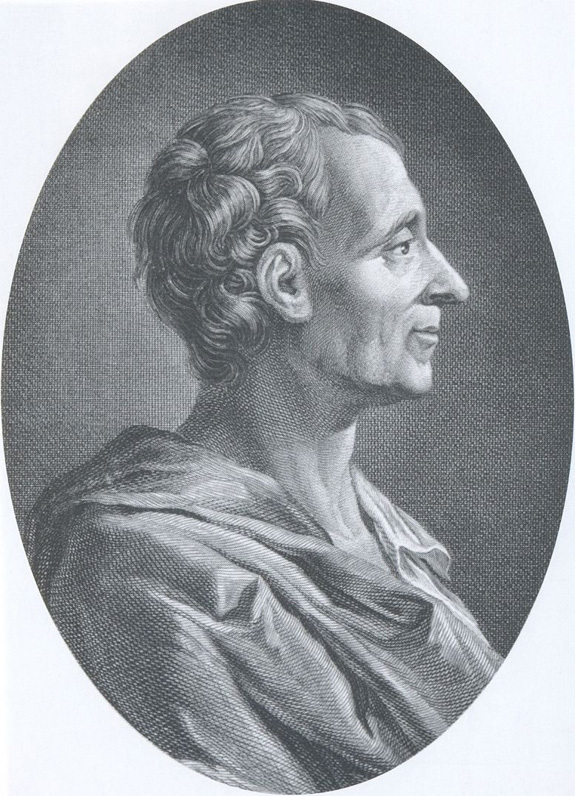
孟德斯鸠
孟德斯鸠推广英格兰崇商的政治制度,认为其肥沃程度比真正的土地要多得多。商业鼓励人们为自己而想,摆脱生前荣誉(这意味着君主政治以及等级制度),看淡死后救赎(用商业替代宗教),改变人们的传统道德风尚观念。商业文明使人们享受到可靠的肉体享受,好的政治制度就是要实现生活的舒适和满足。然而,商业是一种全新的生活方式,并非是没有精神内涵的。但如何使商业文明讲求道德?孟德斯鸠由此论证商人是节俭、节约、勤劳、明智的,只为了增长财富本身,他们通过自己的努力和勤劳获得财富,为商业精神带来了道德精神。所以商业文明提倡人们勤劳、宽容并热爱和平。这与古代提倡的德性是不同的,中国古代提倡仁、智,古希腊提倡正义、节制、勇敢、智慧。孟德斯鸠所提出的节俭、节制能否列入道德的范围?。他将商业文明与政治制度联系在一起,将自由和民主两大要素放到商业文明的建设中去,鼓吹共和政体,认为唯有民主政治才能为所有人的利益服务。这个逻辑虽然严格来讲是说不通的。但民主制度好就好在它与商业文明配套,商业文明能让人变得自由,而平等的权利可以带来自由的诉求,这些要素终将摧毁君主制度,建立民主制度。
然而每个人真的是平等的吗?刘小枫继续解读道,平等必然带来精神层面的抹平化。商业发展可以带来更多的自由,最重要的是国家不会管束个人的道德并开放思想自由、言论自由、行动自由,但孟德斯鸠同时也看到人们对物质财富的沉迷窒息了对艺术的追求和审美以及对美丽却无用的东西的强烈兴趣。尽管如此,他仍然认为英格兰的政治制度是最好的。放弃了对德性的依赖和规定,这个国家是自由的,不鼓励人们去追求某一种德性。因此他认为民主政治有它自己的政治德性,共和政治的德性就是热爱平等、热爱共和国。这是最基本的道德理念,但是用政治德性取代传统德性之后,所有的畸形都会被激发出来,任何的欲望和想象都没有了束缚,就像现在的艺术表达没有高低贵贱之分一样。可以说,自由民主政治制度本身是有问题的,直到今天也没有获得解决。
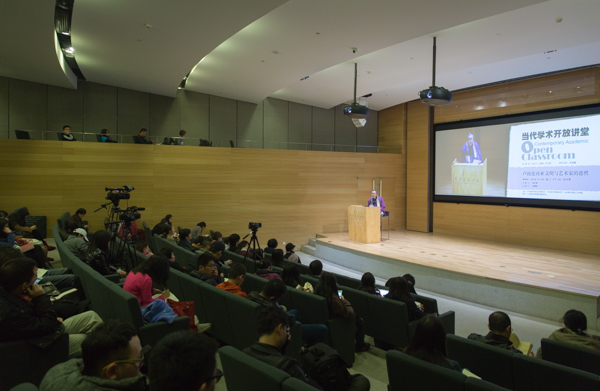
讲座现场
二、卢梭的回答
才华在民主制度中被孟德斯鸠看作是危险的东西,它可能导致一种专制的产生。真正的共和国不应该使用在古人身上发现的德性,也不能在伟大的事物中去实现这种德性,而只能去寻找某些平庸。天赋有害于平等,那么如何使得平等的德性和天赋之间达成平等?刘小枫再次回到卢梭对这个问题的看法。他指出,卢梭认为个人天赋是自然事实,但文艺的发展必须受到一定限制,对于才华,不能追求,只能将其作为手段而非目的。他认为复兴文艺实际上是一种商业文明的诉求,是要求艺术具有社会公用性,是商业化的运作和行为,激发人们取悦彼此的欲望。这与传统古老的艺术追求分道扬镳,古代的艺术旨在欣赏彼此,挖掘一种德性。
卢梭的观点其实是关于艺术的传统认识,古代的艺术是少数人进行自我认识的活动,是艺术家内在德性的展现。现代艺术复兴必然成为败坏艺术家德性的温床,比科学的大众化影响还要坏。同时艺术天才本人和大众的德性都会堕落。因为一旦这些有才华的人融入商业文明中,就意味着必须要取悦大众,变得浅薄轻浮。艺术家会受到另一种专制君主的统治,就是商业化的趣味。由此,卢梭提出在商业文明的时代,如果让艺术家向平庸靠拢,必然会导致其才华的丧失。有天赋的艺术家的命运必然是两极化的,一方面,他们去适应商业化的趣味,成为其奴隶;另一方面则只能扼杀、放弃自己对艺术趣味的追求。
卢梭所论述的艺术家的卓越天赋,其实承担着塑造民族道德风尚的责任。商业化涉及的问题是到底是财富重要,还是道德重要?卢梭看到的商业化对艺术家才华的败坏是彻底的,其另一个极端就是极度张扬天资差异所带来的严重后果。有才华的人为了摆脱大众趣味而努力发展怪异趣味,凸显艺术天资,从而很容易地沉浸到空虚的事物中,制造出乌七八糟的东西。在卢梭看来,追求怪异的天资在人间只会制造出灾难的不平等。这极度夸大了人在艺术智力上的差异,形成怪异的脾性,是一切结果中最危险的。而且在德性上贬值的结果就是用怪异和粗暴否定、糟蹋公共常识,颠覆普通常识性的感受。
曾经,传统艺术对凝聚共同体和高尚趣味起到了重要作用。现今传统的艺术纽带被破坏了。在民主的初期,卢梭天才地预见到了艺术在商业化时代的命运。而生活在他之后一个半世纪的尼采,正身处商业化文明取得决定性胜利的时代。他对现代艺术所下的两个断言和卢梭的观点高度一致。尼采在其晚年的笔记中,将现代艺术概括为一种施暴的、粗糙的艺术,其动机被简化为一种感官的凌乱,追求线条内部凌乱的多样性,而艺术家内在的心性也毫无约束,他们气喘吁吁、近乎绝望。
刘小枫总结道,艺术天赋在商业化进程中的状况必然如此,我们谁都无法否认商业化的力量,在商业化的民主下怎么能叫艺术家不去跟随这种生活方式?然而,是否还有少数的艺术天赋可以保持自我?人的天资不平等是自然事实,而且这种天资无论多好都会受到时代的约束。
卢梭是悲观的。他最后在书中提出要回到艺术的不平等中去。要告诉许许多多的人,我们是平平常常的人,不要以为自己有艺术天赋就动不动去冒充艺术家,安于平凡才是最终的选择。
Q&A
1、卢梭对于文艺复兴的评论是负面的,然而文艺复兴实际上是天才最有成就的阶段,请您解释一下这种反差。
刘:卢梭在讲文艺复兴的时候把商业文明的状况放到文艺复兴上去了,猛烈抨击文艺复兴,实际上文艺复兴和启蒙运动是不同的时期,文艺复兴时期只有少数人从事艺术,这些艺术家无不与君王、贵族联系在一起,是极少数的优秀的人的行为,而不是启蒙运动时期鼓励更多的人搞艺术的情况。商业文明是无法避免的,大众化也是无法避免的,不同的人应该有清醒的自我认识,大家都应该各司其职。
2、请您谈谈对未来的艺术标准的看法
刘:我们对艺术的理解最好是从一些大思想家入手,应该去想卢梭是怎么想这个问题的。卢梭只是在提醒那些真正有天赋的人心里要想明白自己是什么人,与古代的大艺术家做心性上的交流,并观察传统艺术家的德性修养是怎样的。
3、按照您这个结论,会不会推出种族优劣论?
刘:这二者在逻辑上当然是不通的。人在德性上有差异的,这与种族是有不同的,天赋是自然差异,是偶然的。不会形成固定的种族理论,所以古老文明都是从德性入手,追求卓越,比如仁、智、勇。我们现在是属于平等的意识形态的环境,所以需要借鉴卢梭等一些处于转换时代的大思想家的看法。
周颖南/文
董慧萍、张大卫/图
当代学术开放讲堂总叙
主 办:中央美术学院学术委员会、中央美术学院美术馆、中央美术学院人文学院
协 办:中央美术学院青年教师协会
总策划人:刘小东、王璜生、尹吉男
学术主持:宋晓霞
时 间:2013年11月至2014年11月
地 点:中央美术学院美术馆学术报告厅
“当代学术开放讲堂”是以中央美术学院师生为基础,盛邀国内外著名学者以及北京地区的高校学子,共同讨论当代中国艺术、文化以及在全球化和多元文化语境中文化和艺术之间的关系等等与当下中国文化发展密切相关的学术问题的开放性学术论坛。讲堂旨在建立一个先锋的、实验的学术平台,以开放、平等的形式,在同一个场域内进行学术观点上的交流以及思想上的交锋,通过“多言堂”的形式,自由地、创造性地讨论问题;同时尝试在讲堂中建立一种当代的精英意识,并努力将之扩散到整个文化圈,激起学界、文化界对当下中国社会以及中国文化的走向和纷繁复杂的文化现象的反思和探讨。
“当代学术开放讲堂”开讲时,学术主持人宋晓霞教授就明确提出“开放讲堂”的“开放”具有双重含义。“首先,‘开放’意味着在大学的环境里,各种学科不应该成为我们思想和创造的束缚和限制。在当代语境下,这种“开放”代表着艺术对于各学科或是跨学科的“开放”,或者是当代艺术对当代中国的一种“开放”。第二个意义层面上的‘开放’表达的是一种形式上的创造,这种形式不光是‘讲堂’的形式,而且是一次真正的思想上的碰撞。”中央美术学院人文学院院长尹吉男教授则提出更高、更具体的期望:“中央美术学院应该树立一种精英意识,在这种“开放”的理念下,不断进行新的知识生产和观念生产。美院应该变成一个思想的中央、全球的中央;而不是地理的中央、国家的中央。”
“当代学术开放讲堂’在结束后将整理成记录性文稿出版,将受邀嘉宾的观点及其与场内的学生、社会公众的互动和交流以成书形式展示出来,从而引发更多的思考,将各种艺术、文化问题深入并延伸开去,以期在社会上产生一定的文化效应。
当代学术开放讲堂历史回放
第九讲:大明帝国的文化密码——关于大英博物馆的“黄明盛世”展与学术研讨
讲座时间:2014.10.31(周五)下午14:30
主 讲 人:尹吉男 教授
第八讲:自然的复兴与帝国的隐喻:——透纳及现代英国自然观的转变
讲座时间: 2014.09.26(周五)下午 14:00开讲
主 讲 人: 渠敬东 教授
第七讲:乌克兰危机中的大国关系
讲座时间: 2014.06.23(周一)下午 14:30开讲
主 讲 人: 冯绍雷 教授
第六讲:说中国贵族
讲座时间: 2014.05.14(周三)下午 14:00开讲
主 讲 人: 李零 教授
第五讲:寻找观察历史的“中间状态”
讲座时间: 2014.04.18(周五)下午 14:30开讲
主讲人: 杨念群 教授
第四讲:在西方书写中国历史
讲座时间: 2014.03.09(周日)下午14:30-16:00
主 讲 人: 史景迁 金安平 郑培凯 鄢 秀
第三讲:中国近代视野中的后现代与后殖民
讲座时间: 2014.01.10(周五)下午15:30-18:00
主 讲 人: 雷 颐 研究员
第二讲:今天我们怎样做艺术?
讲座时间:2013.12.13(周五)下午 15:30-18:00
主 讲 人: 孙景波 徐 冰 隋建国 彦 风 吴 帆
尹吉男 西 川 邵亦扬 陆 亮
第一讲:何为艺术?——由安迪·沃霍尔引发的讨论
首讲时间:2013.11.14(周四)上午10:00-12:00
主 讲 人:宋晓霞 教授

